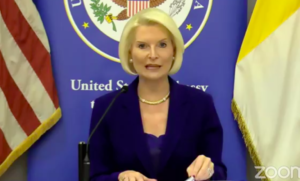“Memory is key to accessing the future”
 “In order to overcome so many deplorable forms of hate we need the capacity to involve ourselves together in remembering. Memory is the key to accessing the future and it is our responsibility to hand it on in a dignified way to young generations”. With these words Cardinal Pietro Parolin, Holy See Secretary of State, stressed the importance of a sense of history in combating anti-Semitism in the closing remarks for the symposium “Never Again: Confronting the Global Rise of Anti-Semitism”.
“In order to overcome so many deplorable forms of hate we need the capacity to involve ourselves together in remembering. Memory is the key to accessing the future and it is our responsibility to hand it on in a dignified way to young generations”. With these words Cardinal Pietro Parolin, Holy See Secretary of State, stressed the importance of a sense of history in combating anti-Semitism in the closing remarks for the symposium “Never Again: Confronting the Global Rise of Anti-Semitism”.
The event, which was held online last week, was hosted by the U.S. Embassy to the Holy See and featured prominent voices on Jewish matters, including Vatican and U.S. officials, among which the U.S. Special Envoy to Monitor and Combat Antisemitism, Elan Carr. The goal was to shed light on increasing anti-Semitic incidents throughout the United States and Europe, including a 2019 shooting in Jersey City at a kosher grocery store and an Oct. 27, 2018, mass shooting at the Tree of Life Synagogue in Pittsburgh.
In her opening remarks, U.S. Ambassador to the Holy See Callista Gingrich noted that while the memory of the Holocaust is still fresh nearly 80 years on, throughout the world Jews are still “vilified, demonized and physically attacked.” “Every free society has a stake in reversing this trend”, she said calling the phenomenon “unconscionable”. Remarks were provided by Lisa Palmieri-Billig, Representative in Italy and Liaison to the Holy See American Jewish Committee, Suzanne Brown-Fleming, director of International Academic Programs at the U.S. Holocaust Memorial Museum, Norbert Hoffmann, secretary of the pontifical Commission for religious relations with the Jews, and Rabbi David Meyer, lecturer Cardinal Bea Centre for Judaic studies pontifical Gregorian University.
In exploring the roots of anti-Semitism, Lisa Palmieri-Billig remarked that anti-Semitism impacts “the health and survival of democracy itself”. “Interreligious dialogue, cooperation and solidarity”, she said, are the positive means to fight against the rising tide of anti-Semitism while preserving democracy.
Dr. Suzanne Brown-Fleming, Director of International Academic Programs at the United States Holocaust Memorial Museum, spoke of the importance of remembering the horrors of the past, saying the atrocities of the Holocaust must be “rigorously, vigorously documented.” She stressed the importance of teaching about the Holocaust, saying facts must be gathered, preserved and passed on so that “the gap between the ‘them’ and the ‘us’” can be closed.
During the symposium Cardinal Pietro Parolin quoted a recently discovered document written by his predecessor, Secretary of State Cardinal Gasparri in 1916. It was written in response to a letter from the American Jewish Committee asking for a response to violence against Jews in the context of World War I. Writing on behalf of Pope Benedict XV, Cardinal Gasparri wrote that the natural rights due to human beings should also be “observed and respected in relation to the children of Israel as it should be as for all men, for it would not conform to justice and to religion itself to derogate there from solely because of a difference of religious faith”.
